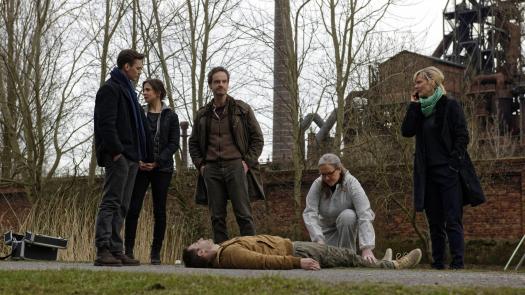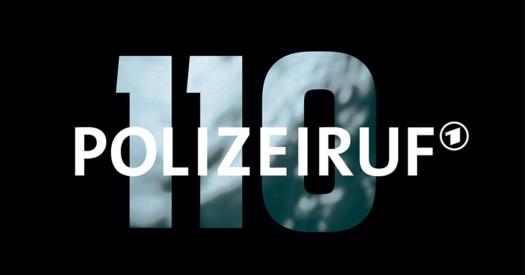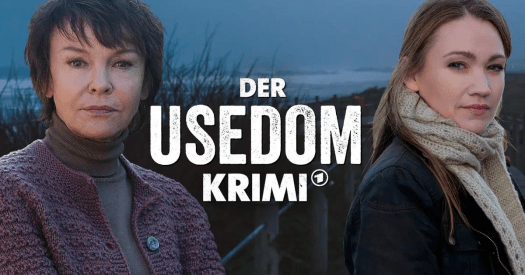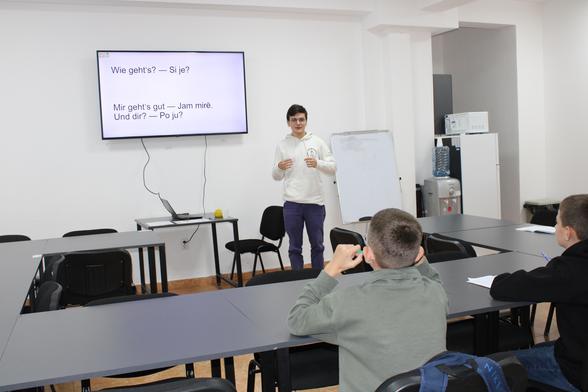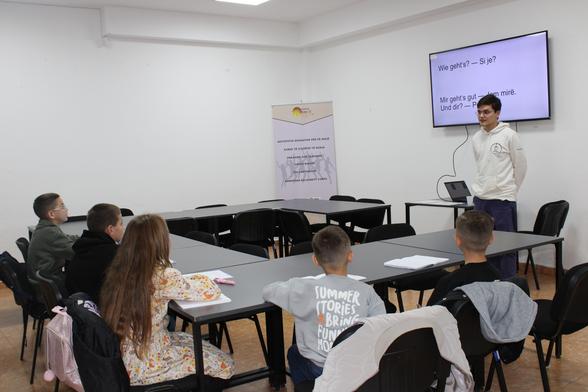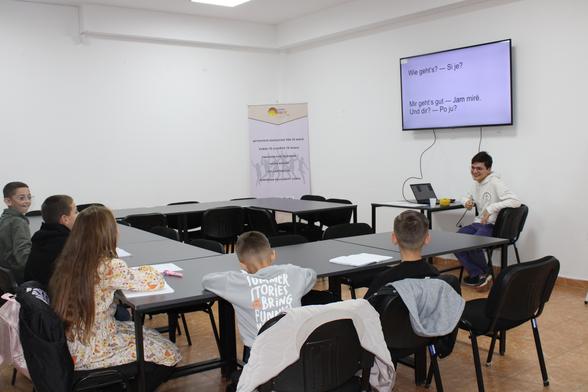Auslandsverwendungszuschlagsverordnung
I know something that may spark all that:
RADIO IRRTUM!
(on air from Berlin)
↓↓↓ Deutsch Version below unten ↓↓↓
Da next issue of #RadioIrrtum! will air this Saturday, 2025/11/22, 8:00pm UTC+1, Berlin time. At Alex Berlin FM at 91MHz / DAB+ K7D around #Berlin + worldwide at https://www.alex-berlin.de/radio-livestream .
Wuzit then?
#Radio Irrtum! is a German language #radioShow exploring the sonic vastness of the #underground. Emitted transmissions may raise attention for new unheard #music all over this planet's genre spectrum. Don't worry about that #GermanLanguage - it's all about the #music!
A lot of it - this time with a bit of focus on Spoken Words!
Covering stuff like
- lightweight musical poems
- voice heavy #organPoint Pop
- dreamy Bulgarian #Triphop
- a #Fediverse dream cooperation of #Bonkwave artists doing classic #DnB
- playful #indietronic
- #140 #Bass full of dancy-pancy energy
- #IBM (the term Radio-Irrtum! uses for Intellectual Bass Music) including Spoken Words
- Experimental #SpokenWords
- less #experimental SpokenWords
- dark Riot Grrrl #Postpunk
- dreamy #Downtempo #Lofi for making you smile
Lots of #CreativeCommons music is included and there are super cool artists from the Fediverse. Like @axwax + @ahihi + @animaexanimata + @poemproducer . Lots of strong women in music too. Lots wont be found on Spotify while it's all here!
Also (mostly for the German listeners I'm afraid) I will explain the organ point composition technique which is featured even in modern music (and without an organ if you are lucky).
And I will merge Johann Sebastian Bach's name into "Johannes Bach" by misstake at one point. I honestly know better! I can say this because the show is preproduced (and still I didn't catch this before uploading it to the radio station; this is bad!).
Anyway: If at least a bit interested in kewl new unusual #music, tune in! 📻
Got questions? I'll gladly answer! Just ask here!
Playlist + manuscript after the show also here.
CU all (?) on Saturday.
↑↑↑ English version above, the Deutsche welche jetzt ↓↓↓
Radio Irrtum! kommt näher → Samstag, 22.11.2025, 20:00 isses soweit auf Alex Berlin (FM 91MHz/DAB+ K.7D / Stream URL oben).
Also die seltsame Funk(el)sendung, in der planetenumfassende Weiten des musikalischen Untergrunds erforscht werden.
Diesmal mit einem gewissen Fokus auf Spoken Words.
Und dabei so Sachen wie…
- ↑↑↑ naja - steht ja alles oben! ↑↑↑
Vieles davon gibz nich auf Spotify, dafür gibz viel Creative Commons; & wir hamn massig Fediverse Künstler:innen vertreten (s.o.).
Ich erkläre, was der Orgelpunkt ist und sage "Johann Sebastian Bach" falsch.
Wird schön! Playlist + Manuskript nach der Sendung hier drunter. Fragen einfach hier stellen – ich antworte.
#musicRecommendations . Oh, and btw: #againstAIinMusic
Free Virtual Lecture: "The German Audience for the U.S. Declaration of Independence" on Thursday 20 November 2025 @ 6:00 pm ET.
Free registration required to receive a Zoom link.
Almost immediately after being adopted by the Second Continental Congress on July 4, 1776, the United States Declaration of Independence was translated into German. Learn about the first German-language broadsides and newspaper printings of the Declaration, the importance of German printers in Philadelphia, and the different approaches to translation taken in the United States and in Europe.
#America250 #Free #Webinar #DeclarationOfIndependence #GermanLanguage #Translation #Printers #Philadelphia #AmericanRevolution
@histodons
Learning German? Don’t miss these crime TV shows
As a language tutor, I always encourage students to spend as much time as possible listening to content in their target language. I’ve blogged on this topic several times before, but this time I’m writing from the perspective of a language learner, as well. I’ve been learning German for a number of years now, and one of my greatest allies has been the on-demand service of the German public television – the amazing ARD Mediathek.
For all who are learning this language or wanting to immerse themselves in the German media culture, the ARD Mediathek is the one-stop destination for numerous TV programmes, shows, and documentaries, most of them available for on-demand viewing outside Germany. To me, as a learner, ARD Mediathek has been additionally useful because of readily available German subtitles accompanying most programmes, which is of great help when you’re trying to follow content in a language you’re still trying to master.
While I enjoy different genres, in this post I’ll share my top 5 crime TV series from Germany, currently available on ARD Mediathek. Some of them I’ve been following for years, and they’ve become a part of my daily routine. Maybe you’ll enjoy them, too!
TATORT
Source: “obs/ARD Das Erste”Tatort (“Crime Scene”) is the ultimate German television classic – a prime-time TV series that’s been on TV since 1970. Each episode is produced by a different regional public broadcaster – a member station of the ARD, so the investigating teams come from different parts of Germany (plus Austria and Switzerland, which now also take part in the production). Their separate storylines – some of which have been running for years – reflect regional differences, including dialects, which should be of interest to language learners.
Unlike many light-hearted, cosy mystery TV shows out there, Tatort is usually pretty dark, although that, too, depends on the regional team and the particular storyline. Don’t be surprised by an emotionally overwhelming or nightmarish episode from Berlin followed by a humorous one from Münster. In any case, the series goes well beyond petty crime, often addressing difficult social issues and current affairs in a surprisingly blunt and candid way. No wonder episodes of Tatort consistently provoke comments and public debates, as well as extensive coverage in the German press.
POLIZEIRUF 110
Another TV show with a uniquely German background: Polizeiruf 110 (“Police Call 110”) started in the former German Democratic Republic back in 1971. It took off as East Germany’s version of Tatort, originally produced by Deutscher Fernsehfunk. Similar in concept, Polizeiruf 110 initially tended to be more involved with social problems. Watching the old GDR-period episodes, you can tell there’s an underlying message in line with the proclaimed values of the socialist regime.
After the German reunification, unlike most other East German TV shows, Polizeiruf 110 successfully survived. As with Tatort, investigating teams are based in different places, mainly the towns and cities of the former East Germany, such as Rostock and Magdeburg. My personal favourite, though, are the episodes set in and around the Polish village of Świecko, right on the German-Polish border, tackling the issues facing small rural communities in a borderland region with a volatile past.
In the ARD Mediathek you can find both the current and the old, classic episodes, which makes Polizeiruf 110 a fascinating television journey through the political and social landscape of the German East. Yes, it’s a crime TV show, but if you’re a careful observer, it’s much more than that.
DER USEDOM-KRIMI
Before saying anything about this series, I’ll add a note that – depending on your location – you may not be able to access all of the episodes in the Mediathek due to copyright restrictions. And this pains me so much, because Der Usedom-Krimi is one of my all-time favourite series, German or otherwise.
Set on the island of Usedom in the Baltic Sea, split between Germany and Poland, the series follows Karin Lossow, a former state prosecutor. After her release from prison, where she had spent a number of years for killing her husband (the background alone is thrilling!), Karin returns to the island and seeks to rebuild her life and mend the relationship with her daughter. As different crimes happen on the island, Karin helps out with the investigations, using her talents and many years of experience as a prosecutor.
Why do I love this series so much? To start with, Karin is played by Katrin Sass, who is such an incredible character and an excellent actress – you many have seen her in the celebrated 2003 film Goodbye, Lenin, where she played the mother. Let’s just say that she brings a lot of her sass (pun definitely intended!) to Der Usedom-Krimi. Then, the location, attention to detail, and intelligent plots all contribute to a perfect mix that makes this a very successful crime drama. I’ve found it oddly comforting, in ways that I can’t fully explain. Each episode made me want to pack up my bags and go visit the Baltic coast.
MORDEN IM NORDEN
Moving on to more light-hearted content, Morden im Norden (“Murder in the North”), is a police procedural set in the northern German city of Lübeck. The series was first launched in 2012, initially as part of a separate line of evening-TV crime shows under the title of Heiter bis tödlich.
The episodes follow two leading investigators, Finn Kiesewetter and Lars Englen (played by Sven Martinek and Ingo Naujoks), along with a cast of regular supporting characters. Whereas Tatort and Polizeiruf 110 often conclude on a frustratingly tragic note, Morden im Norden is jovial in comparison, with a much greater likelihood of a happy outcome. Also, more attention is paid to the main characters’ private lives and their interpersonal relations, plots are more quirky and relaxed, plus you get to see a lot of Lübeck.
While Polizeiruf 110 and Der Usedom-Krimi bring many East German reminiscences and flashbacks, Morden im Norden has, unsurprisingly, a very northern flair that you’ll recognize in many little details, from the occasional (but very limited) use of Plattdeutsch, to mentions of many Northern delicacies.
MORD MIT AUSSICHT
Last but not least, Mord mit Aussicht (“Murder with a View”) is a typical German Schmunzelkrimi, i.e. a crime comedy with all the elements of this genre. The series is set in the fictional village of Hengasch in the Eifel mountains of western Germany. Apart from the humorous plots, the series is full of likeable characters and beautiful nature scenes. It’s very relaxing and truly belongs to the cosy mystery type of TV shows.
I slightly preferred the original cast led by Caroline Peters as the Komissarin Sophie Haas, but the later episodes with Katharina Wackernagel playing Marie Gabler are just as fun.
First broadcast in 2008, new episodes are still in production, scheduled to run at least until 2027.
There are many more crime TV shows available in the ARD Mediathek that come to mind as I’m writing this post, but these are my top 5 right now. If you’re learning German and looking for something fun and interesting to watch, you can’t go wrong with these. They will also help you to learn more about different parts of Germany, as well as the contemporary German culture and society in general.
Are there any other crime TV shows from the German-speaking countries that you’d like to recommend? Post about them in the comments section below!
NOTES
If you wish to receive new content from the Grammaticus blog in your inbox, please enter your email address in the box below. You can also subscribe to my free monthly Newsletter.
To support my work, you can send me a donation via PayPal. It would be greatly appreciated!
COVER IMAGE
A snapshot from the Tatort – Dortmund episode “Zorn” (2019), produced by WDR.
#ARD #ARDMediathek #cosyMysteries #crime #DerUsedomKrimi #German #GermanLanguage #Germany #learningGerman #MordMitAussicht #MordenImNorden #Polizeiruf110 #Tatort #television #TVSeries
Tìm kiếm ứng dụng tạo giao thức họp trực tuyến mã nguồn mở miễn phí ngoại tuyến trên github. Khuyến nghị ứng dụng hỗ trợ tiếng Đức và họp MS Teams #MeetingProtocol #ỨngDụngHọpTrựcTuyến #MãNguồnMở #OfflineApp #GermanLanguage #MSTeams
https://www.reddit.com/r/LocalLLaMA/comments/1oq09kh/is_there_any_good_offline_free_open_source/
With over 18 years of experience, study abroad consultant in Faridabad, YES Germany provides tailored guidance to students pursuing Bachelor's or Master's in Germany, covering course selection, admissions, visa processing, and accommodation arrangements.
For More Info Visit: https://www.yesgermany.com/study-abroad-consultant-in-faridabad/
#yesgermany #studyabroad #overseaseducation #germaneducation #studyingermany #germanlanguage #ielts #educationconsultant
I just read RFC 2119 which defines those uppercase words (MUST, SHOULD) that are used in Internet standards. The interesting thing about translating these, at least when translating to German, is this: must = muss (like in "this is a law you must follow") but "must not" ≠ "muss nicht". What is a prohibition in English turns into a lax "you don't need to do this, this doesn't have to happen" in German when both words are translated literally.
You may even raise dat feeling to the brink with...
RADIO IRRTUM!
(on air from Berlin)
↓↓↓ Deutsch Version below unten ↓↓↓
Da next issue of #RadioIrrtum! will air this Saturday, 2025/10/25, 8:00pm UTC+2, Berlin time. At Alex Berlin FM at 91MHz / DAB+ K7D around #Berlin + worldwide at https://www.alex-berlin.de/radio-livestream .
#Radio Irrtum! is a German language #radioShow exploring the sonic vastness of the #underground. Emitted transmissions may raise attention for new unheard #music all over this planet's genre spectrum. Don't worry about that #GermanLanguage - it's all about the #music!
A lot of music by great musicians Wikipedia bouncers deem to be irrelevant, a lot of music you won't find at #Spotify (so better leave this crap for good).
This time covering stuff like
- Dark #popmusic straight from #Mexico
- Alternative #Pop, sounding like Stereolab meets Gary Numan
- #Bonkwave (or maybe it isn't)
- finest laid back #140bass
- #experimental #Bass
- IDM #Bass (well, that makes it #IBM, right?)
- real experimental #IDM
- Experimental #granular #accordion music
- Dresden #DoomMetal
- #PostPunk, as if Birthday Party jams with the B-52s
- real beautiful french #Piano Chanson Pop
There is #CreativeCommons music included and of course super cool artists from the Fediverse will be featured like @n3wjack or @anja .
Anyway: If at least a bit interested in kewl new unusual #music, tune in! 📻
Got questions? I'll gladly answer! Just ask here!
Playlist + manuscript after the show also here.
CU all (?) on Saturday.
↑↑↑ English version above, the Deutsche welche jetzt ↓↓↓
Radio Irrtum! kommt näher → Samstag, 25.10.2025, 20:00 isses soweit auf Alex Berlin (FM 91MHz/DAB+ K.7D / Stream URL oben).
Also die seltsame Funk(el)sendung, in der planetenumfassende Weiten des musikalischen Untergrunds erforscht werden.
Mit so Sachen wie…
- großartig dunkler mexikanischer Popmusik
- Alternative Pop, wo stilistisch Sterolab auf Gary Numan treffen
- Bonk Wave (oder kein ~)
- Feinsten laid back 140 Bass
- experimentellen Bass
- IDM Bass (ja – wir hamn' kleinen Bass Schwerpunkt)
- Super Experimentellen IDM
- Experimental granular Akkordeon Music
- Dresden DOOM
- Post Punk, der klingt, als ob die Birthdayparty auf die B52s treffen
- Unglaublich schöner französischer Piano Chanson Pop
Vieles davon gibz nich auf Spotify, die Wikipedia kennt die meisten nicht (aber alles was ich spiele hat Relevanz!); dafür kommt Creative Commons Musik vor; und wir haben diverse Fediverse Künstler:innen vertreten (s.o.). Yo.
Wird wieder heftig schön! Playlist + Manuskript nach der Sendung am Sonntag hier drunter. Fragen einfach hier stellen – ich antworte.
#musicRecommendations . Oh, and btw: #againstAIinMusic
**TITLE:** GLM-4.6 bị yếu trong tiếng Đức [Tремен]
**POST:** Dù GLM-4.6 cải thiện tổng体, tiếng Đức bị spregunt (Các từ ảo, lỗi ngữ pháp). Ví dụ: "Passphrases" → "Passphrasen", "passieren" → "passiert". Dù có tăng cường code, thành ngữ-price encloc notoriously. Khiêuája: الاستخدام nhắc đến các mô hình khác. Tags: #AI #GLM #GermanLanguage #TechNews #PhátTriểnAnh X filepath #Nghệ ThuậtNgôn Ngữ
https://www.reddit.com/r/LocalLLaMA/comments/1o6xmok/glm46_worse_in_german_than_glm45_why/
